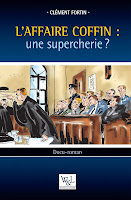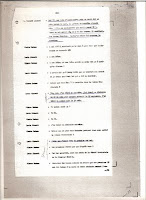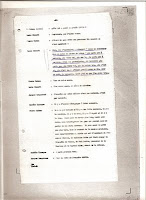
BONNES VACANCES
HAPPY HOLIDAYS
Je me permets de vous faire quelques suggestions de lecture pendant vos vacances.
Vous pouvez vous procurer mes livres chez Wilson & Lafleur
http://www.wilsonlafleur.com/
http://www.wilsonlafleur.com/WilsonLafleur/default.aspx?Action=Detail&CodeCat=340.471
Wilson & Lafleur Ltée
40, rue Notre-Dame Est
Montréal (Québec)
H2Y 1B9
Téléphone : 514 875-6326
Sans frais : 1 800 363-2327
Télécopieur : 514 875-8356
Courriel : librairie@wilsonlafleur.com
Heures d'ouverture
Librairie : lundi au vendredi de 9 h 00 à 17 h 00
Administration : lundi au vendredi de 9 h 00 à 16 h 10
May I suggest that you read my books on your vacation. You may order them from Wilson & Lafleur.
Voici quelques commentaires que des journalistes ont fait au sujet de mes livres:
Here are some comments that were made about my books. The literal translation is mine.
L'Affaire Coffin, une supercherie?, dissipe tout soupçon quant aux assertions de certains dont le sénateur Hébert selon lesquelles le procès a été bâclé et que Coffin a été condamné, car le jury était formé de Gaspésiens ignorants. On a fait entendre au jury des dizaines de témoins qui ont rassemblé les éléments d'une preuve circonstancielle écrasante contre Coffin. (L’affaire Coffin : une supercherie ?, clears up all suspicion about the assertions made by some, senator Hébert is one of them, purporting that the trial was botched and that Coffin was condemned because the jury was formed with ignorant Gaspesians. Dozens of witnesses were heard who brought together the elements of an overwhelming circumstantial evidence against Coffin.)
David Santerre, Le Journal de Montréal
Dans un minutieux travail de reconstitution du célèbre procès, l'avocat Clément Fortin en arrive à une brutale conclusion.(In a meticulous work of reconstituting the famous trial, the lawyer Clément Fortin reaches a brutal conclusion.)
Bryan Miles, Le Devoir
Le juge Brossard avançait que les propos de Jacques Hébert étaient sans fondement. Pour sa part, Clément Fortin fait valoir que n’eût été le brûlot de Jacques Hébert clamant l’innocence de Coffin, l’affaire Coffin serait oubliée depuis belle lurette, et le public n’aurait pas si longtemps douté du bon déroulement du procès. (Justice Brossard put forward that Jacques Hébert’s remarks were unfounded. Clément Fortin explains that without Jacques Hébert’s pamphlet crying out Coffin’s innocence, the Coffin affair would have been forgotten a long time ago.)
Rollande Parent, Le journal du Barreau
Contrairement aux livres à succès de feu Jacques Hébert, celui de M. Fortin s’appuie sur une documentation solide. Il démonte la thèse de l’erreur judiciaire, sans pour autant prendre parti clairement. (Unlike Jacques Hébert’s bestsellers, Mr. Fortin’s book relies on a solid documentation. He takes to pieces the miscarriage of justice thesis, without however taking a clear stand.)
Yves Boisvert, La Presse
Loin d'être un pamphlet, L'affaire Coffin : une supercherie? s'attarde avec patience aux faits présentés aux jurés. L'auteur se garde quelques pages à la fin de son bouquin pour donner ses conclusions, sans plus. Quelques commentaires qui suffisent toutefois à faire comprendre que toute la controverse sur la non-culpabilité de Coffin a longtemps vogué sur une vague de ouï-dire, de sensationnalisme et d'intérêts politiques. (Far from being a pamphlet, L’affaire Coffin : une supercherie ? patiently lingers over the facts submitted to the jurors. The author reserves for himself a few pages at the end of his book to give his conclusions. A few comments are sufficient however to realize that the whole controversy on the non-guiltiness of Coffin has drifted for a long time on a wave of hearsay, sensationalism and political interests.)
Éric Nicol, Le Journal de la Vallée
Clément Fortin n’a pas ménagé ses efforts afin de reconstituer le plus fidèlement possible les éléments de ce drame. (Clément Fortin has spared no effort to reconstitute as faithfully as possible the elements of this drama.)
Jean Larrivée, L’Estuaire
Pas l’ombre d’un doute : ce fascinant docu-roman porte un dur coup à la thèse de Jacques Hébert. Il résume les 2 250 pages de transcriptions sténographiques et de procédures du procès de Wilbert Coffin, à Percé, en 1954. Loin des ragots, il s’en tient aux faits mis en preuve devant la Cour du banc de la reine. (Without the shade of a doubt, this docu-novel strikes a hard blow at Jacques Hébert’s thesis. It summarizes the 2 250 page short-hand transcripts and proceedings of Wilbert Coffin’s trial, at Percé, in 1954. Far from gossips, he sticks to the facts which were proven before the Court of Queen’s Bench.)
http://andrepronovost.com/Nouvelles.htm

L’auteur fait revivre l’affaire Poisson dans un docu-roman. En 1954, au Collège de Matane, le frère Oscar Lalonde est tué à coups de marteau. Trois étudiants sont écroués et traduits en justice. Un bon suspense judiciaire…
The author brings back to life the Poisson affair. In 1954, at the Collège de Matane, Brother Oscar Lalonde was murdered with blows of hammer. Three students were imprisoned and prosecuted. A good suspense…”
« Un avocat retraité en fait une solide étude de cas dans On s’amuse à mort au collège de Matane… » (A retired lawyer makes of it a solid case study in On s’amuse à mort au Collège de Matane…”
Michel Auger, Le Journal de Montréal
« Un véritable reportage où l’on voit deux avocats en vue se livrer à une lutte acharnée pendant les 23 jours que dura le procès : Jean Bienvenue pour la poursuite et René Letarte pour la défense. Le mobile du crime? Un simple geste gratuit inspiré du film américain The Rope! Pas si gratuit que ça, le geste : la discipline de fer des Clercs de Saint-Viateur était terriblement pesante… « (A real report wherein we see two renowned attorneys indulging in a fierce battle during the 23 days of the trial; Jean Bienvenue for the prosecution and René Letarte for the defence. The crime motive? A simple gratuitous gesture inspired by the American film The Rope! Not so gratuitous than that, that gesture: the iron discipline of the Clercs de Saint-Viateur was terribly heavy…) Didier Fessou, Le Soleil
« Il [Clément Fortin] a eu la bonne idée de reprendre sous nos yeux le procès pour une affaire de meurtre authentique qui s’est passée à Matane en 1964. Me Fortin nous fait revivre cette histoire des annales judiciaires.... « (He (Clément Fortin) has had the good idea to take up before our eyes the trial for a real murder that happened in Matane in 1964. Me Fortin brings back to life this murder affair.)
Daniel Rolland, Culture Hebdo.com

Le manuscrit de ce roman historique dont l’action se déroule au début du siècle dernier, principalement à Matane, a obtenu une mention d’honneur à titre de finaliste du concours La plume d’argent édition 1997. (The manuscript of this historical novel whose action takes place at the beginning of the last century, mainly in Matane, has received a mention of honour as finalist in the literary contest La plume d’argent édition 1977.)
Clément Fortin raconte Matane dans un roman. (Clément Fortin recounts Matane in a novel.)
Romain Pelletier, La Voix du dimanche
« Voilà une œuvre majeure, où l’on décrit avec vérité une petite ville de chez nous, et son peuple que l’on regarde vivre, évoluer pendant un siècle. » (Here is a major work, where one describes with truth a small town and its people whom one watches living during a century.)
Marcel Séguin, ancien président de la Société des écrivains canadiens, section de Montréal (Past president of the Society of Canadian Writers, Montréal section)
L’écriture historique exige précision et objectivité. Le roman laisse plus de latitude et s’accommode bien de la fantaisie. Le roman historique, en se situant entre ces deux pôles, impose à son auteur la tâche peu facile de jouer sur les deux plans. Clément Fortin réussit avec brio cet exercice dans Les amours du Pied-de-la-Côte. (Historical writings require precision and objectivity. Novels leave more liberty and adapt well to fantasies. Historical novels, while being located between these two poles, impose on its author the uneasy task of playing on both plans. Clément Fortin succeeds brilliantly in this exercise in Les amours du Pied-de-la-Côte.
Robert Fournier, Au pays de Matane



















.jpg)
.jpg)
.jpg)
.jpg)
.jpg)



.jpg)
.jpg)
.jpg)
.jpg)
.jpg)
